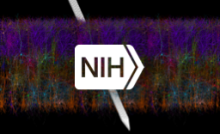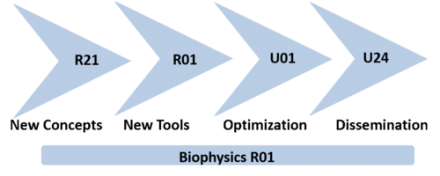
This week, we will highlight BRAIN Initiative notices of funding opportunities (NOFOs) for fiscal year 2022. Today’s post summarizes NOFOs for neural recording, modulation, and stimulation tool development in animals and humans.
The NOFOs below aim to enhance our knowledge of the brain by funding the development and application of tools for neural recording, modulation, and stimulation. Proposed projects should involve invasive and/ or non-invasive in vivo technologies useable in behaving animals (vertebrates and invertebrates), and eventually in humans. Applicants should include plans to develop new large-scale recording methods, develop tools for circuit manipulation, and/ or link brain activity to behavior.

BRAIN Initiative vision for tool development, optimization, and dissemination.
RFA-EY-21-001 New Concepts and Early-Stage Research for Recording and Modulation in the Nervous System (R21; Reissue of RFA-EY-18-001; Clinical Trial Not Allowed)
This NOFO encourages the generation of entirely new, unique, and untested ideas for innovative technologies in a very early stage of conceptualization. This award also supports calculations, simulations, and computational models for showing that tools are theoretically capable of large-scale recording in behaving animals or humans. Funding can also be used to test prototypes and prepare tools for proof-of-concept testing. Engineers and others outside the field of neuroscience are encouraged to apply. Applications are due on May 2 and October 28, 2022.
RFA-NS-21-026 New Technologies and Novel Approaches for Recording and Modulation in the Nervous System (R01; Reissue of RFA-NS-18-020; Clinical Trial Not Allowed)
This award supports proof-of-concept testing and the development of new technologies and approaches for large-scale neural recording and modulation. Applicants are encouraged to creatively address major challenges in neural recording. Proposed projects are expected to be high-risk and can incorporate diverse types of signaling beyond neuronal electrical activity. New technological approaches can include modalities such as optical, magnetic, acoustic, and genetic recording/ manipulation. Applications are due on May 2 and October 28, 2022.
RFA-NS-21-027 Optimization of Transformative Technologies for Recording and Modulation in the Nervous System (U01; Reissue of RFA-NS-18-019; Clinical Trials Not Allowed)
This NOFO aims to optimize existing and emerging technologies related to recording and modulating neural activity. Funding is intended for the iterative refinement of tools that have already gone through proof-of-concept testing (see RFA-NS-21-026). Projects can utilize various modalities for neural signal recording and modulation. This award supports hardware/ software development and the broad dissemination of tools into regular neuroscience practice. Applications are due on May 2 and October 28, 2022.
Despite recent advances in neural recording and simulation technologies, we know little about how using these devices affects the brain at a basic cellular or circuit level. The award below supports projects studying the biological effects of novel neural perturbation technologies, or invasive and non-invasive tools that stimulate, inhibit, or modulate neural activity.
RFA-NS-20-006 Biology and Biophysics of Neural Stimulation (R01; Reissue of RFA-NS-18-018)
This NOFO seeks applications to systematically characterize, model, and validate the membrane, cellular, circuit, and adaptive biological responses of neuronal and non-neuronal cells to neural perturbation. This award also aims to advance our understanding of the biological and bioinformatic content of these signals. Funding can be used to support experiments designed to characterize responses in several model systems, including in vitro, animals, and humans. Proposals to develop new technologies, therapies, and disease models are not applicable. Application due dates are February 1 and October 3, 2022.
Many BRAIN grant applications require plans for data sharing (NOT-MH-19-010) and a Plan for Enhancing Diverse Perspectives (PEDP; NOT-MH-21-310). Please carefully review each NOFO to see if an award falls under one or both policies.
Please visit the BRAIN Initiative’s Funding Opportunities webpage for more details on these and other awards. Did you miss earlier posts on FY2022 NOFOs? If so, check out the main BRAIN blog page here.
